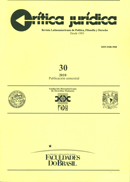The Zapatist Movement and its Impacts on the Democratic Transition and the Conformation of a new Democratic Political Culture in the Indigeneous People
Main Article Content
Abstract
This text deals with some relevant aspects of the Zapatistas analyzed in its two main aspects.On the one hand, its outer side discusses the impact that this collective actor has had in the process ofdemocratic transition in the Mexican State. Claiming that, since its public emergency in 1994, zapatismohas been important in order to understand the political changes that the regime has experienced, with actions as the “Color f the Earth” March in 2001 and its ability to introduce topics in the national politicalagenda which were discussed by the decision-making bodies. On the other hand, its internal side tries toanalyze the impact that the actions of the movement have had in the indigenous support bases, in politicalparticipation and the trends for the formation of a democratic political culture materialized in the newpolitical subjects, such as the Zapatista rebel autonomous municipalities and the boards of governancestructures. The background of the article is the discussion about democracy through two slopes andwhose livelihood lies in the zapatista idea and practice of ordering trough obeying, as the basis of the zapatista conception of “another way of doing politics”.
Article Details
How to Cite
Ramírez Zaragoza, M. Ángel. (2010). The Zapatist Movement and its Impacts on the Democratic Transition and the Conformation of a new Democratic Political Culture in the Indigeneous People. Crítica Jurídica. Revista Latinoamericana De Política, Filosofía Y Derecho, (30). https://doi.org/10.22201/ceiich.01883968p.2010.30.35461
